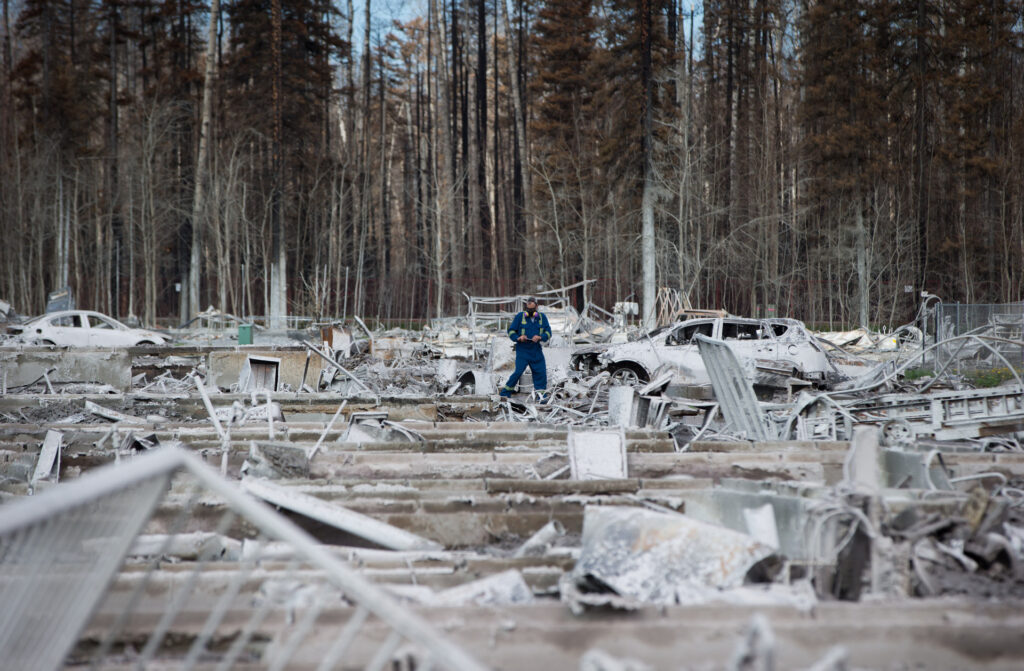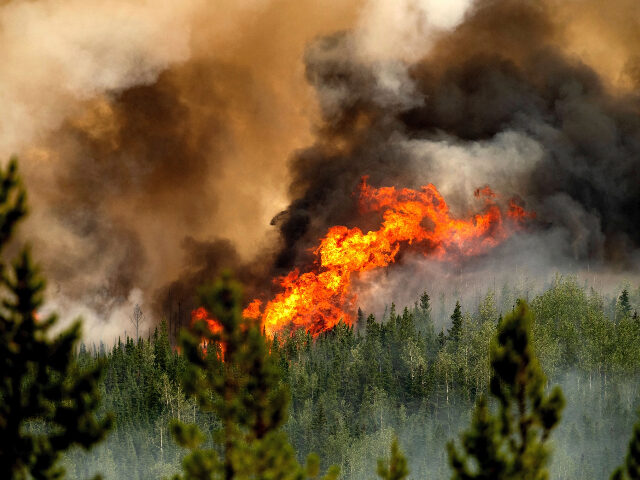Authorities ordered residents of Fort McMurray, Alberta, Canada, to be ready for evacuation at a moment’s notice as wildfires draw closer, threatening a region that produces more than one million barrels of oil per day.
Alberta issued a notice on Friday that said an “out-of-control” wildfire — more than 2,400 acres in size — posed an “extreme” risk to the Fort McMurray Forest Area.
High winds and frontal systems moving through the area made it difficult to predict the course of the blaze, so evacuation alerts were issued for several communities in Alberta and British Columbia — including Fort McMurray, which lost more than 2,400 homes and businesses to a wildfire in 2016 that was considered the most expensive natural disaster in Canadian history at the time.

Resident Dale Pillar takes photographs of the remains of his house, which was destroyed in a wildfire, in Fort McMurray, Alberta, Canada, on June 3, 2016. (Darryl Dyck/Bloomberg via Getty Images)
Fort McMurray residents told CTV News on Monday they remembered the painful lessons of 2016 and were ready to evacuate at a moment’s notice this time.
“Last time, we weren’t [prepared]. My husband didn’t even believe me, then he turned on the radio, and it said, ‘You have 30 minutes to evacuate.’ And we were like, ‘What do we do?’” resident Courtney Sweeney recalled.
“This time around, people just want to be really, really cautious, but, at the same time, make sure you follow the actual news updates. And don’t try and follow too much on social media because sometimes things get blown out of proportion,” she said.
The most menacing wildfire grew rapidly on Saturday but remained about ten miles southwest of Fort McMurray on Monday. Fire officials were optimistic that calming winds and light rain could keep the fire from approaching any closer to the city. Most of the fire’s movement was to the southeast, which was good news for Fort McMurray but bad news for the increasingly imperiled community of Anzac.
Alberta Wildfire spokeswoman Josee St-Onge said a new weather system arriving could push the fire back toward Fort McMurray, but the lucky break in extreme conditions on Monday gave fire crews valuable time to prepare.
“There are containment lines in place, and there are fire guards being built, so all of that puts us in a better situation. We’re pretty confident that, if the wind shifts in a direction where we don’t want it to go, that we would still be able to hold it,” she said.
“We’ve had some rainfall at a good time to bring down the fire danger at a time when it could have become much more escalated, so we’ve been lucky in that sense, and we’ve been able to keep the fires that started fairly small,” she said.
“A bit of rain buys us some relief and some time, but it doesn’t overcome drought conditions that have been here for years. We are still on alert and ready to respond to new wildfires because we will see more. We’re just getting started on the season,” she cautioned.
Another Alberta Wildfire spokesperson, Christie Tucker, said on Monday that 18 new wildfires were sparked across the province from Friday to Sunday, bringing the total to 45. A crew of 46 firefighters with 13 helicopters are fighting the major blaze threatening Fort McMurray.
Another wildfire burning in the County of Grande Prairie, dubbed the Kleksun Creek Fire, swelled to almost 1,400 hectares in size and prompted evacuations as it burned out of control.
Tucker and Regional Fire Chief Jody Butz warned area residents that flying drones near the wildfires is illegal, as it poses a danger to airborne fire crews. Tucker said:
If you fly a drone over or near a wildfire, you could be endangering firefighters, and you could cause firefighting operations to stop. Let us do our job and fight Alberta’s wildfires safely. If people are identified for flying drones and they are found to be interfering with our firefighting, action can be taken legally.
On Monday, Canadian National Railway (CNR) suspended services north of High Level in Alberta and between Fort St. John and Fort Nelson in British Columbia due to the wildfires. Fort Nelson has been largely evacuated due to one of the first and largest wildfires of the season.

COMMENTS
Please let us know if you're having issues with commenting.